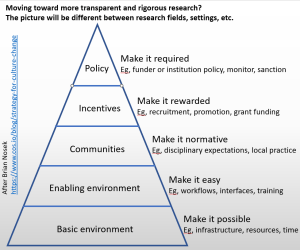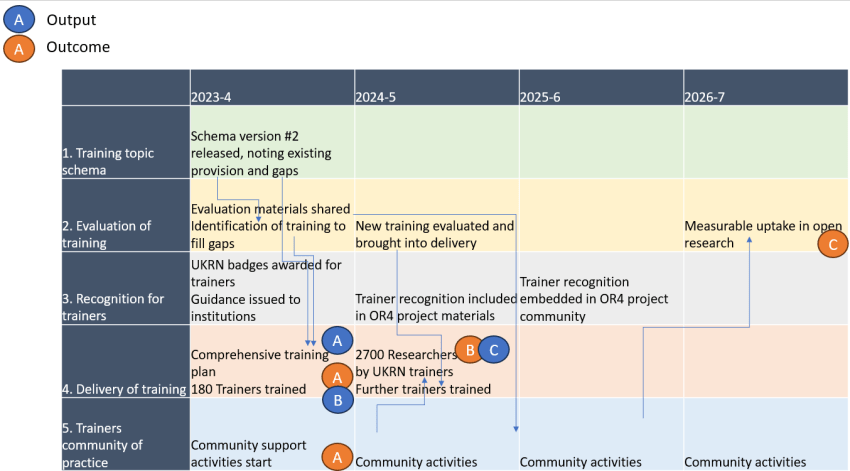Training
UKRN Open Research ProgrammeLead
Eric White (Oxford Brookes)
Background and scope
The Programme aim is to accelerate the uptake of high quality open research practices. The Center for Open Science theory of change highlights five types of action that can promote change. This project is focused on making open research easy and, in particular, enabling institutions to build staff skills in high quality open research practices relevant to a wide range of research types.
Aim
 This project will build staff skills in high quality open research practices through the provision of instructor training and support for trainers.
This project will build staff skills in high quality open research practices through the provision of instructor training and support for trainers.
Goals
Intervention outputs and outcomes
- By Dec 23, a comprehensive training plan published, including planned provision, community support and work to fill gaps, leading to instructor training for 180 trainers by Sep 24.
- By Sep 24, 180 trainers are trained and supported to deliver training in various open research practices, leading to 2700 researchers being trained by Sep 25.
- By Sep 25, 2700 researchers trained in open research practices, leading to measurable acceleration in their uptake by Aug 27.
Evaluation objective and output
- By Aug 26, report published providing evidence on the extent to which the project aim was met.
Activities
| Activity | Description and contribution to [outputs and outcomes] |
| 1. Training topic schema | The training topic schema defines the scope of the training topics, mapped to existing frameworks, and noting provision and gaps. It serves as a catalogue for planning [A] and for users [B]. Schema Graphic |
| 2. Evaluation of training | Mechanisms are in place to evaluate training (i) before it is listed in the schema [A] and (ii) when it is delivered within the Programme [B]. Guidance and support is available to support trainers evaluate the training they deliver in institutions [C]. |
| 3. Recognition for trainers | Mechanisms are in place for the Programme / UKRN to recognise trainers. Guidance and support are in place for institutions to enable and encourage them to recognise the work of trainers [B]. |
| 4. Delivery of training | Training is delivered [A]/[B]. |
| 5. Trainers community of practice | Activities are organised and facilitated to enable trainers to both form a community of practice and actively participate in communities elsewhere [B]/[C]. |
Schedule and relations between activities

Dependencies with other projects in the Programme
The ‘Management and sustainability’ project provides leadership, adequate resources, communications and other relevant support to the project.
The ‘Sharing and integrating’ project should define and, where appropriate, provide hosting for project outputs and training materials in a way that enables institutions to share and learn from related practice.
The ‘Evaluation design’ project should provide insight into researchers’ priorities for and experiences of training for open research practices at their institution.
The ‘Recognition and reward’ project should support institutions as they recognise the work of their trainers.
The ‘Recognition and reward’ project may look to the ‘Training’ project to provide training in institutions to enable them to better recognise and reward open research.
The ‘Reward and recognition”, “Training” and “Integration and sharing” projects are all supporting communities of practice, and coordination will be needed.
Communications and engagement
Events will be organised to enable trainers at partner institutions to develop into a community of practice.
Instructor training will be advertised to partner institutions in a timely manner, and feedback sought on progress.
Sharing and integrating
Improve how insitutions share and integrate practice
Evaluation and Design
Developing effective ways to assess changes among researchers and institutions
Management and Sustainability
Enables the other projects to deliver their goals
Reward Recognition (OR4)
To support the institutional implementation of responsible researcher assessment policies and procedures
